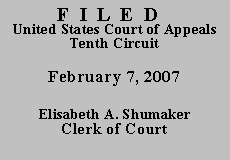

| UNITED STATES OF AMERICA, | |
| PlaintiffAppellee, | |
| v. | |
| AMADO GARCIA, | |
| DefendantAppellant. |
To obtain a certificate of appealability, Petitioner must make a "substantial showing of the denial of a constitutional right." 28 U.S.C. § 2253(c)(2). In order to meet this burden, Petitioner must demonstrate "that reasonable jurists could debate whether (or, for that matter, agree that) the petition should have been resolved in a different manner or that the issues presented were adequate to deserve encouragement to proceed further." Slack v. McDaniel, 529 U.S. 473, 484 (2000) (quotation omitted).
We have carefully reviewed Petitioner's brief, the district court's disposition, and the record on appeal. Nothing in the facts, the record on appeal, or Petitioner's filing raises an issue which meets our standard for the grant of a certificate of appealability. For substantially the reasons set forth by the district court, we DENY Petitioner's request for a certificate of appealability and DISMISS the appeal. We do, however, GRANT Petitioner's motion for leave to proceed on appeal in forma pauperis.
Entered for the Court
Monroe G. McKay Circuit Judge
*. This order is not binding precedent, except under the doctrines of law of the case, res judicata, and collateral estoppel. It may be cited, however, for its persuasive value consistent with Fed. R. App. P. 32.1 and 10th Cir. R. 32.1.
1. Petitioner requested that we hold our decision in abeyance pending the Supreme Court's decision in Burton v. Stewart, 127 S. Ct. 793 (2007). The Supreme Court subsequently ordered the habeas petition in that case dismissed for lack of jurisdiction. Id. Accordingly, that decision has no impact on the instant petition.